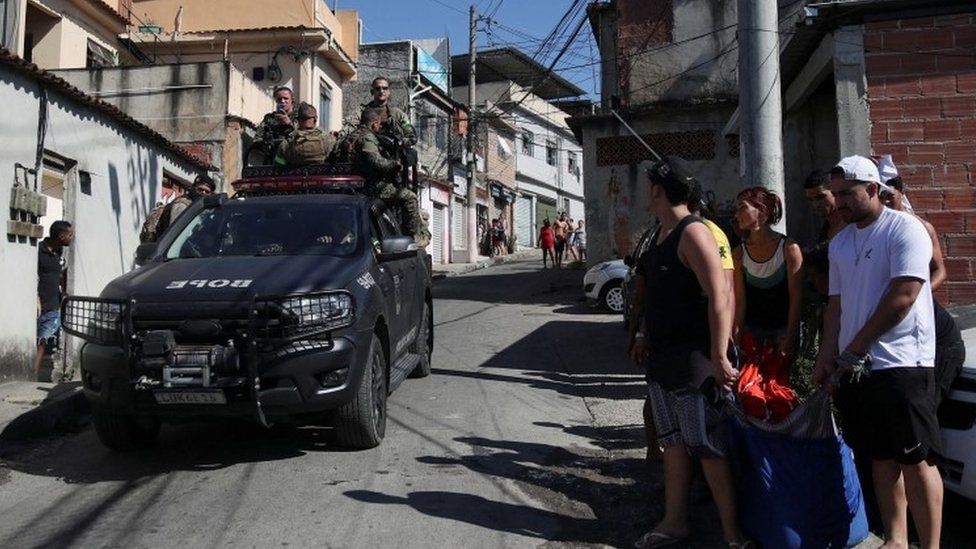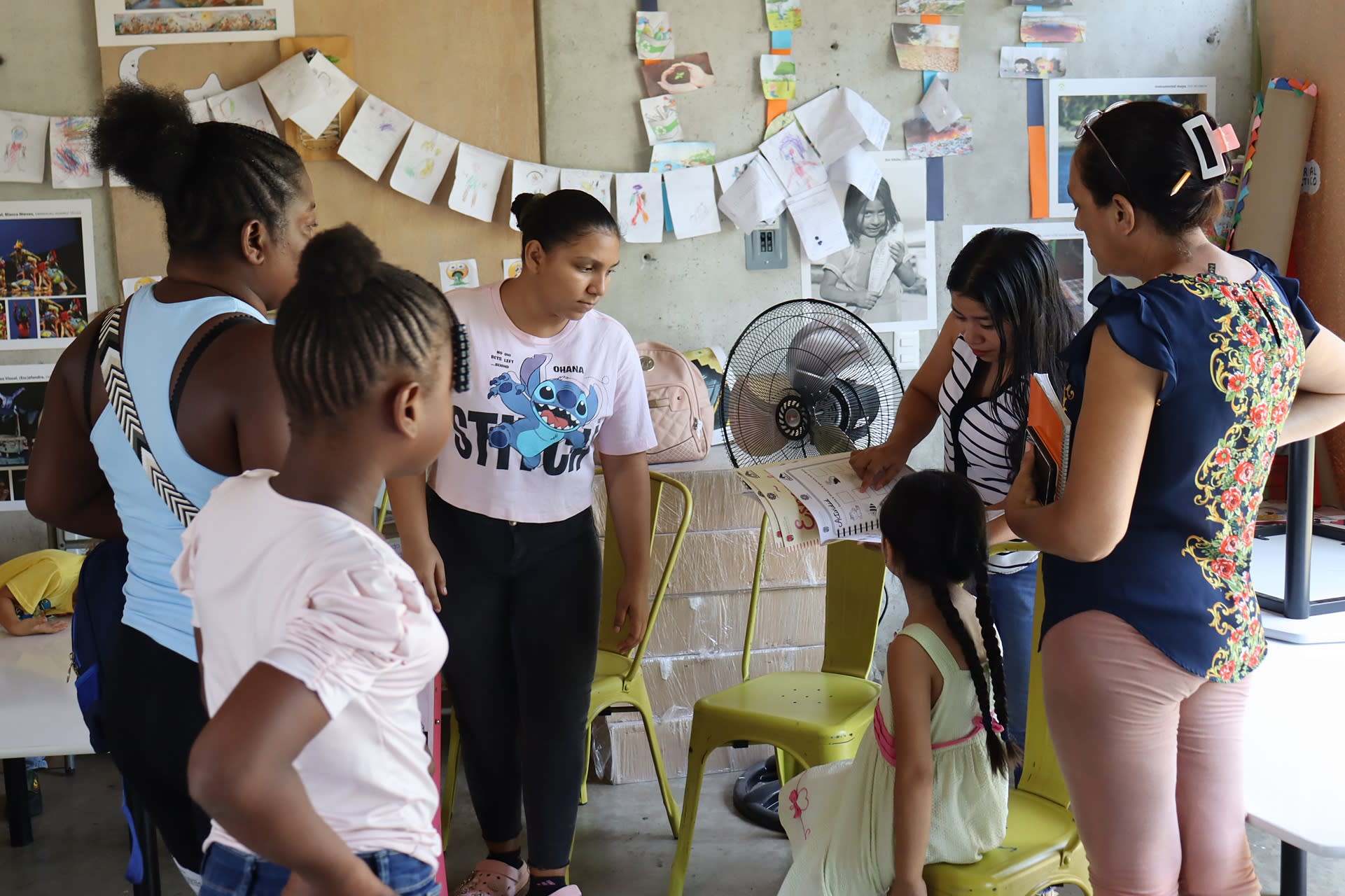International
At least 18 killed in police raid on Rio favela

AFP
At least 18 people were killed in the latest police raid targeting organized crime groups in Rio de Janeiro’s favelas, Brazilian police said Thursday.
A law enforcement officer and a woman who lived in the area were among those who died in the Complexo do Alemao slum, while the 16 others are believed to be members of organized crime groups, a police spokesman told a press conference.
Some 400 officers were involved in the massive operation, backed up by 10 bullet-proof vehicles and four helicopters.
Their target was a criminal group that had robbed vehicles carrying cargo for banks and other businesses.
Police spokesman Ivan Blaz said the operation’s goal was to stop the “expansionist policy” of criminal gangs in Complexo do Alemao.
The Public Defender’s office and the Brazilian Bar Association’s human rights commission told AFP separately that they had been informed of 20 people being killed in the raids, including the officer and the bystander.
President Jair Bolsonaro lamented the death of the police officer, 38-year-old Bruno de Paula Costa, but did not mention any of the other people killed.
“He died after a clash with criminals,” the far-right leader said in a statement broadcast on social media.
Colonel Rogerio Lobasso, the officer in charge of the operation, expressed his condolences over the 50-year-old woman’s death, which he said is under investigation.
Her boyfriend told news site G1 that police had shot her while they were stopped at a traffic light.
“They shot at the car. I just saw her collapse next to me. When I looked, she had a hole in her chest,” said Denilson Gloria.
Central America
Trump Administration Asks Supreme Court to Block Return of Deported Salvadoran

The Trump administration on Monday asked the U.S. Supreme Court to block a lower court order requiring the return of a Salvadoran migrant who was mistakenly sent to a maximum-security prison in El Salvador, despite having legal protection from deportation.
The U.S. government has until Monday to bring Kilmer Armado Ábrego García back to the United States, as ordered by Judge Paula Xinis in a Maryland court.
According to The Washington Post, the administration argues it lacks authority to comply because Ábrego García is currently in Salvadoran custody.
The U.S. had appealed Judge Xinis’ ruling to the Fourth Circuit Court of Appeals, but the court declined to act immediately—prompting the administration to take the case to the Supreme Court. In its filing, the government stated that “the Constitution entrusts the President, not federal district courts, with the conduct of foreign diplomacy and the protection of the nation from foreign terrorists, including through deportation.”
Ábrego García, a resident of Prince George’s County, Maryland, and married to a U.S. citizen, came under scrutiny in 2019 after an informant claimed he was a member of the MS-13 gang (Mara Salvatrucha).
Although he was initially slated for deportation, a judge later granted him a stay of removal after he requested asylum, according to the lawsuit.
Nevertheless, U.S. Immigration and Customs Enforcement (ICE) detained him on March 12, claiming his status had changed, and sent him to a detention center in Texas.
International
Teachers in Southern Mexico Bring Education to Stranded Migrant Children

Teachers in southern Mexico have created a program to provide classes for migrant children stranded in the region, following a year-over-year increase of over 70% in irregular migration among minors—many of whom lose months or even years of education during their journey toward North America.
In Tapachula, the largest Mexican city bordering Central America, three teachers offer preschool, elementary, and secondary education through the Chiapas State Migrant Education Program (Pemch).
This initiative has been replicated in key municipalities across Chiapas, including San Cristóbal de Las Casas, the capital Tuxtla Gutiérrez, Palenque, Comitán, and other border towns. Currently, there are around 1,345 migrant students and a total of 35 teachers working across farms and shelters.
Pablo Arriaga Velázquez, a teacher with the migrant education program in Tapachula, told EFE that the project was born in response to the large number of migrant minors, as enrolling them in regular schools is often difficult.
Central America
Mulino and Orsi Highlight Shared Vision After Panama Joins Mercosur as Associate State

The Presidents of Panama, José Raúl Mulino, and Uruguay, Yamandú Orsi, highlighted on Monday the path of integration both countries have undertaken in areas such as trade and the defense of democracy, following a meeting held at the Panamanian government headquarters.
In a brief statement to the press, both leaders emphasized that Panama and Uruguay share many values and are working together across different sectors. They also underlined a renewed connection following Panama’s accession last December to the Southern Common Market (Mercosur) as an Associated State.
“Panama has begun a new era of looking southward, seeking opportunities not only for work, business, and friendship, but also for regional integration in a positive sense. Today, I believe we have taken a decisive step in that direction,” said President Mulino.
The Panamanian leader stressed that his country and Uruguay “have much in common” and share “important values in terms of democracy, respect for institutions, and the rule of law—principles that must always be strengthened, no matter how much effort it takes.”
-

 Internacionales2 days ago
Internacionales2 days agoErik Prince Backs Ecuador’s Daniel Noboa in Fight Against Crime and “Narcoterrorism”
-

 Central America3 days ago
Central America3 days agoPanama’s former president Martinelli claims political enemies tried to kill him
-

 Central America2 days ago
Central America2 days agoGuatemala’s Legal Chief Shot Dead in Parking Lot: Investigation Underway
-

 International3 days ago
International3 days agoJavier Milei vows to work ‘side by side’ with the U.S. on trade rules
-

 Central America13 hours ago
Central America13 hours agoHonduras Hosts CELAC Summit Amid Regional Concern Over U.S. Deportations
-

 International13 hours ago
International13 hours agoTeachers in Southern Mexico Bring Education to Stranded Migrant Children
-

 Central America13 hours ago
Central America13 hours agoMulino and Orsi Highlight Shared Vision After Panama Joins Mercosur as Associate State
-

 Central America13 hours ago
Central America13 hours agoTrump Administration Asks Supreme Court to Block Return of Deported Salvadoran















